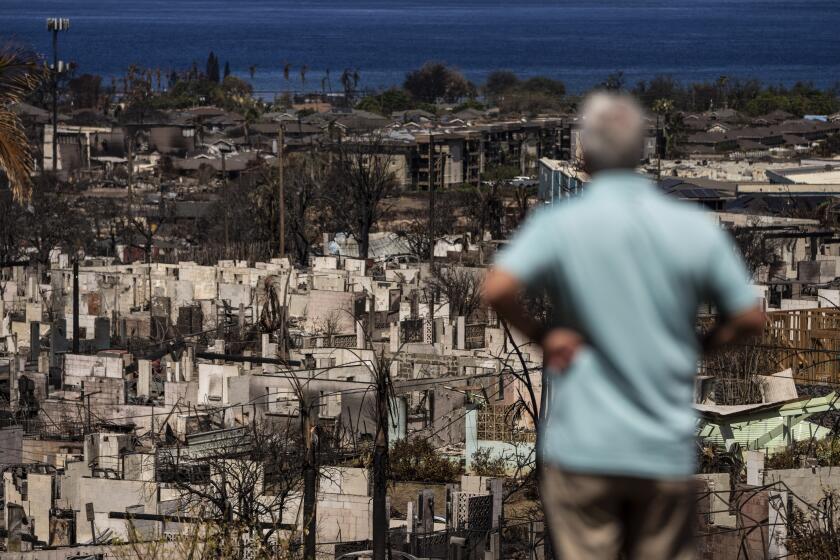Female Afghan Newscaster Silenced by Taliban Militia
Shafika Habibi’s nightly newscasts in firm, precise tones once soothed the frayed nerves of many Afghans in this war-shattered capital.
But today, like so many other women in Afghanistan, Habibi has “disappeared.”
Once held up as a symbol of women’s emancipation in Afghanistan, Habibi’s 35-year career came to an abrupt end when the Taliban religious militia captured Kabul on Sept. 27. Imposing their strict version of Islam, Taliban leaders banned women from schools and most workplaces, saying the mixing of men and women leads to immorality.
Habibi has left her apartment just once since then, to collect wages that the Taliban government continues to pay all women employees.
“Women are just waiting,” Habibi said. “It’s boring.”
Taliban leaders have allowed a few women to return to work in all-female environments--maternity wards, for example. But the vast majority of the 150,000 women who aid agencies estimate were employed in Kabul before the takeover are forced to stay home.
Habibi’s low profile made tracking her down a bit like ghost hunting.
“Shafika, I am sure, has left the city,” said a man guarding the gate of Radio Afghanistan. “It’s no use looking for her.”
She was not recognizable outside her home, dressed in the compulsory burqa--a head-to-toe garment that allows only a mesh over the eyes.
“I used to wear the burqa out of choice, not to be recognized,” she recalled wistfully.
She debuted in 1961, at age 16, as the country’s first woman broadcaster, two years after emancipation for women. Her father, a doctor, was outraged, especially after she appeared on the front of a national magazine, head adorned with earphones, a symbol of the new Afghanistan.
“He didn’t want to see my face for six months . . . and then, only after my brothers and mother intervened,” she said.
When Afghan television was being set up in 1978, President Mohammed Daoud sought a woman newscaster to emphasize his commitment to equality. Habibi was a natural.
She thinks her finest hour was the night Soviet invaders took over the broadcast building in December 1979.
“The Russians moved into the station. They shot the guard in the forehead. They lined up all the workers and took us to a room,” she said. “I was sure we were going to be shot.”
Instead, they were kept hostage the whole night.
“I begged them to let me broadcast, to reassure and calm people, saying, ‘The situation is calm.’ ”
In the morning, the Soviets agreed. Then they sent her home. Six days later, they summoned her back.
“There wasn’t a large pool of people who knew broadcasting,” she said with a shrug.
Habibi adapted when Muslim insurgents threw out the Marxist regime in 1992. She took to wearing a scarf, albeit one that allowed carefully coiffed ringlets to caress her forehead.
She hopes Taliban leaders will be reasonable as well, although the militiamen who are a constant presence on the streets have beaten women who appeared with just their eyes exposed.
“I’m trying to make as many contacts as possible with the Taliban,” she said, her voice tensing. “If Western governments reopened embassies, the Taliban might soften their stance.”
Her final broadcast, the night before Taliban troops took the city, was a recital of poetry in Dari, the Persian dialect that predominates in Kabul.
She saw herself as a reference point for correct Dari pronunciation.
Now, she gets visibly upset when she hears her male successors making mistakes.
For Kabul women, her disappearance has become as much a symbol of the new order as her nightly appearances were of the old.
“I liked her voice, her appearance,” said Maryam, a 20-year-old woman who spends most of her time at home. “Now we are dead. There’s nothing I can do. The women of Kabul have been abandoned.”
More to Read
Start your day right
Sign up for Essential California for news, features and recommendations from the L.A. Times and beyond in your inbox six days a week.
You may occasionally receive promotional content from the Los Angeles Times.






